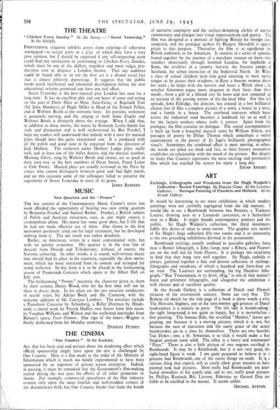THE THEATRE
PROFESSIONAL etiquette inhibits actors from refusing—if otherwise unengaged—to accept parts in a play of which they have a very poor opinion, but I should be surprised if any self-respecting actor could find any satisfaction in performing in Chicken Every Sunday, which must be one of the dullest, stupidest and most vulgar pro- ductions ever to disgrace a London theatre. That any audience could be found able to sit out the first act is a dismal social fact that is almost infinitely depressing. It suggests that the public needs much intellectual and emotional development before the new educational reforms promised can have any real effect.
Sweet Yesterday is the best musical play London has seen for a long time. It has an excellent plot and can boast of some real acting on the part of Doris Hare as Mme. Sans-Gene, of Reginald Tate (Sir John Manders), of Hugh Miller as Head of the French Police, and of Webster Booth as the romantic hero. Its patriotic sentiment is genuinely moving, and the singing of both Anne Ziegler and Webster Booth is distinctly above the average. When I add that, in addition to these merits, the music by Kenneth Leslie-Smith has style and distinction and is well orchestrated by Ben Frankel, I hope my readers will understand that nobody with a taste for musical plays should miss this quite exceptional one. It is produced with all the polish and good taste to be expected from the direction of Jack Hulbert. The orchestra under Herbert Lodge plays really well, and at least one of the ballet dances, and the musical number, Morning Glory, sung by Webster Booth and chorus, are as good in their own way as the best numbers of Oscar Straus, Franz Lehar or Cole Porter. Musical plays are usually reviewed in the Press by critics who cannot distinguish between good and bad light music, and on this occasion some of my colleagues failed to perceive the superiority of Sweet Yesterday to most of its genre.
JAMES REDFERN.


























 Previous page
Previous page